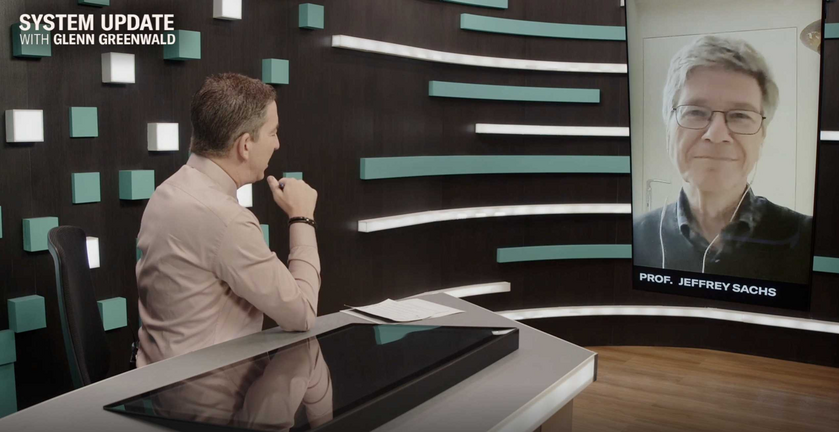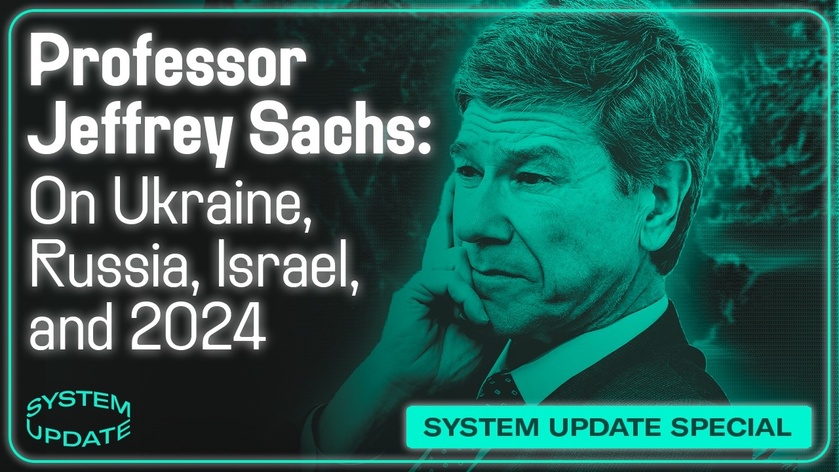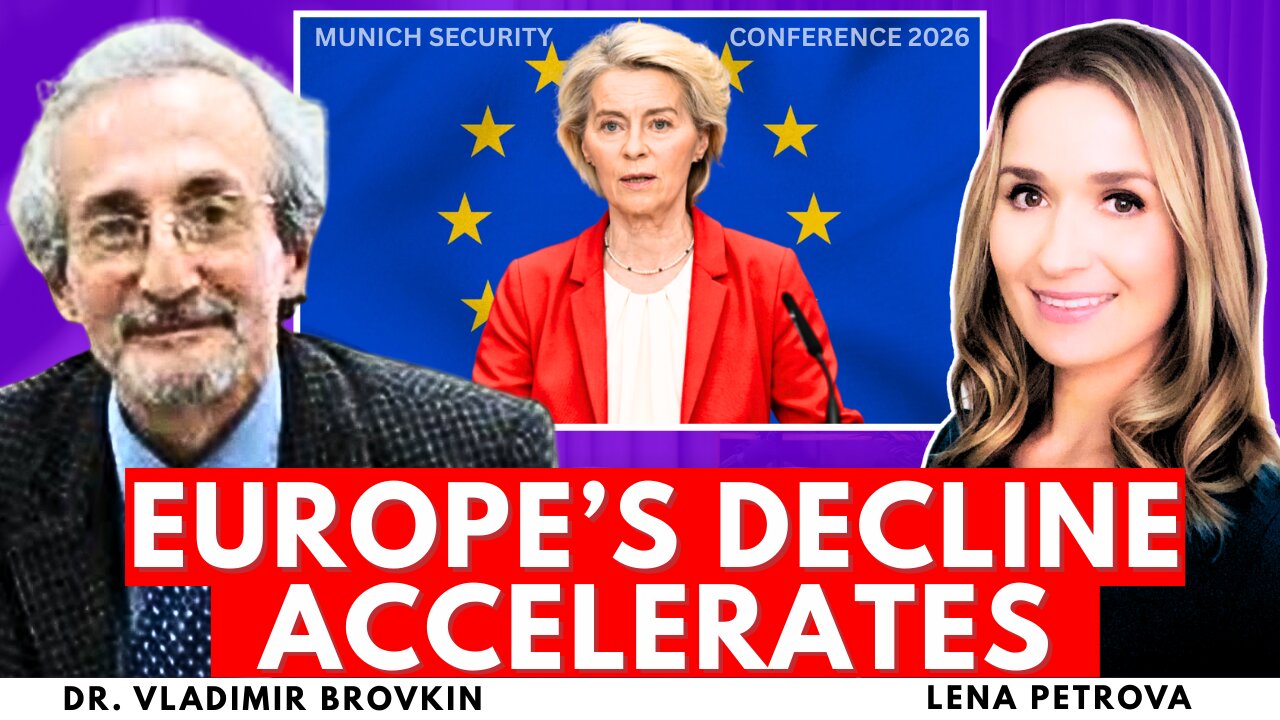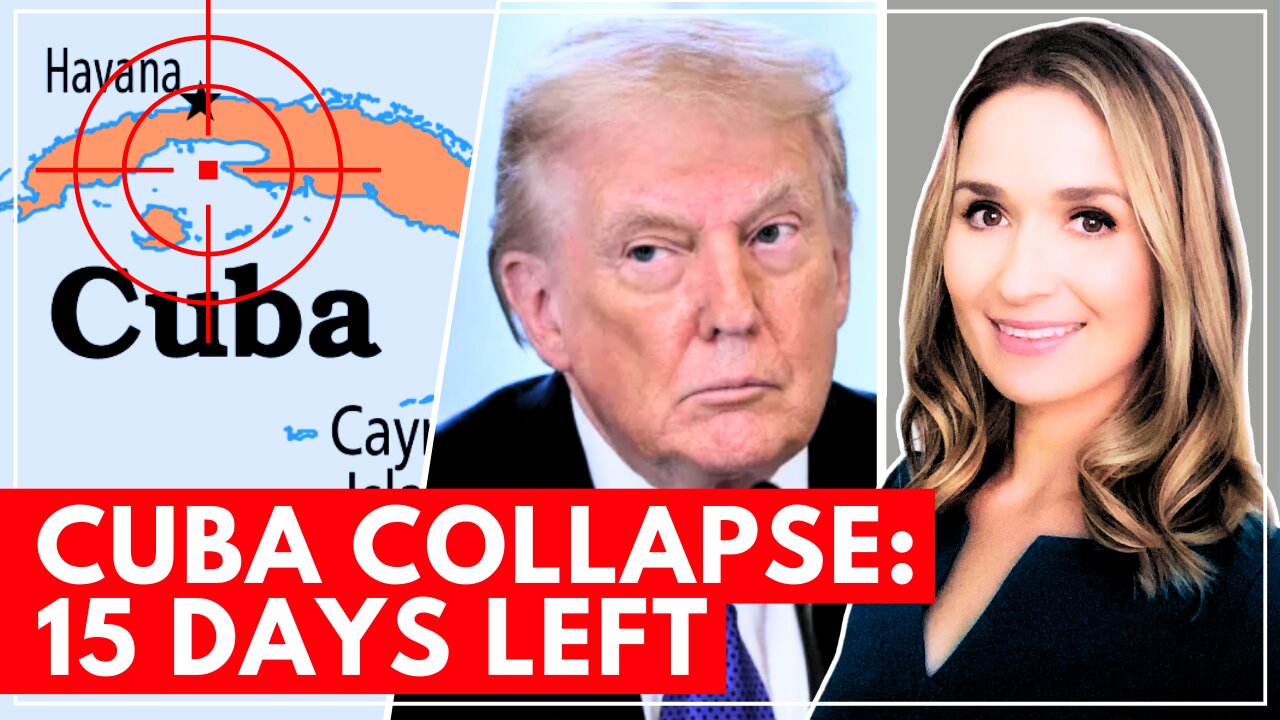Watch the full episode HERE
It's Friday, October 4.
Tonight: Professor Jeffrey Sachs is a frequent guest on our program and one reason for that is that he is easily one of the most interesting public policy analysts with a virtually singular trajectory. Sachs, who is now on the faculty of Columbia, spent most of his early career at Harvard. That is where he received his bachelor's, master's, and Ph.D. in economics and was named a full professor by the age of 28. The reason for that extreme height up the ladder was that Sachs in the ‘80s and early ‘90s had become one of the most influential and globally respected economic policy planners on the planet. He had led several countries almost single-handedly, including Bolivia and Poland, out of their debt crises and became a significant advisor to the post-Soviet governments of Russia under both Mikhail Gorbachev and Boris Yeltsin. In sum, Professor Sachs has always had one foot planted quite centrally in the most influential mainstream circles.
As recently as 2020, he was named by Lancet to cheer its commission on COVID-19, showing that he continued to be on the inside of significant mainstream organizations. His frequent media appearances, including on many network news programs and outlets like “Morning Joe,” were reflective of how respected he was in those kinds of establishment circles. And yet Sachs, despite his access to the highest circles of political power and policymaking, has never really been an adherent, certainly not a reliable hearing of establishment orthodoxy. Over the years, he has become increasingly critical, one might say radically so, of the core orthodoxies of the U.S. government and particularly of its foreign policy. He has long been a vehement critic of neoconservative ideology, was a vocal opponent of the U.S.-NATO role in the war in Ukraine, from the start, and has become one of the sharpest and most emphatic opponents of Israeli government actions and U.S. support for them. He also, even in his position as chair of that COVID commission, ended up concluding and arguing that it was more likely than not that the epidemic originated from a leak in the Wuhan lab and not from naturally occurring viruses.
Now he has found himself so alienated by establishment Washington, you'll never see him on “Morning Joe” anymore, that he announced his protest support for Jill Stein and the Green Party in the 2024 presidential election as a way of expressing his increasingly radical discontent with the U.S. security state and its ongoing control of our government, regardless of which party wins elections. Shortly before this show, we sat down with him for a little bit over an hour for a very wide-ranging and I think very thought-provoking discussion about the 2024 elections, about the uniparty as represented by the support for Kamala of the Cheney family and Bush-Cheney neocons, the broader historical context for how militarism and neoconservatism and interventionism came to drive U.S. actions since the early 1990s. We talk about both the war in Ukraine and the regional war now raging in the Middle East and we end, or at least he does, on a surprisingly optimistic note, with a surprisingly optimistic vision for how all of this finally might be overturned.
Like Professor John Mearsheimer, who was interviewed last night, Professor Sachs speaks not as a pundit or an ideologue, but as a scholar who has deeply studied all of these issues, as well as a first-hand participant in many of the historical events that continue to shape these policies, as well as our current war policies.
For now, welcome to a new episode of System Update, starting right now.
Interview: Jeffrey Sachs

G. Greenwald: First, it's always great to see you. Thanks so much for taking the time to talk to us today.
Jeffrey Sachs: Great to be with you. Thanks. Thank you.
G. Greenwald: As is usually the case when we have you here, an enormous amount is going on, crises all over the world, wars that are escalating. We obviously want to delve into those a great deal but before we get to those, I think that we haven't had you on since you announced your decision to endorse neither Donald Trump nor Kamala Harris, but instead to endorse Jill Stein's candidacy for president and the Green Party ticket. Can you talk about the reasons you made that choice?
Jeffrey Sachs: Well, basically, I can't even vote for her on the New York ballot, so, I don't feel we have much choice. I don't think either of the two main candidates is up to the job of being president and I don't feel like voting for anybody that isn't up to the job. It's pretty bad that we have this situation.
G. Greenwald: When you say not up to the job, do you mean they aren't personally capable of carrying out the duties of the presidency or are there specific issues where you believe neither of those two candidates have the right view or the right understanding of the issues to be an effective president?
Jeffrey Sachs: Both. I don't think either for different reasons, is really capable of guiding our country to security and safety. That requires helping to guide the world to security and safety and I don't believe that either Trump or Harris is likely to do that. Neither of them has what it takes to be able to do that, which is both the knowledge and personal character to make the right decisions. Trump, we know about, I don't have to belabor the point. Harris is not only completely inexperienced, she shows no recognition of the real issues in international affairs. She pretty much blindly follows the Biden administration, which may be a bit understandable in her capacity as vice president but is not so understandable in her capacity as a candidate for the presidency. Both of them are on the deeply wrong side of the issues in the Middle East. Both of them are completely obedient to the Israel lobby, which is a disaster for Israel first and foremost, but also for the United States and the world. I should say first and foremost, for the Palestinian people. Let me be clear, but then also for Israel, for the United States and the world. And both seem to be pretty slavishly following that Israel lobby line when it comes to China. They compete with each other over who could be nastier and I would say dumber in how we're approaching our relations with China. It's not good. It's just not good at all.
G. Greenwald: Yeah, I get all that and those are all things that I want to dive into a little bit more deeply with you. Before we do, just on the same topic, you made a podcast appearance on the “All-In” podcast alongside Professor Mearsheimer, who's a frequent guest on our show and, in fact, he was on our show last night and we spent most of our time talking about the Middle East and Ukraine, but also about the 2024 election. And what he said is that this argument Trump is making about why he's more trustworthy or more liable to foster stability and peace in the world – namely that I was president for four years and none of these wars were breaking out, it was only once Biden was in office did the Russian invasion of Ukraine happen, it was only once Biden was in office that October 7 happened and everything that followed from that, now, the world is sort of in flames, whereas when I was president for four years, the war was more or less stable without a lot of very dangerous wars breaking out – and I asked him: do you think that was just kind of a coincidence, good luck on Trump's part, or is there something about Trump's demeanor and approach and ethos that is responsible for that? He said he thinks the Democratic Party's instinct now is to always be in favor of military intervention in one way or another, whereas he thinks Trump's is to be averse to that, that he considers not engaging the United States in wars to be kind of a source of pride for him. Do you think there's any validity to that perspective?
Jeffrey Sachs: There could be. It's possible. But on the other hand, I would say Trump made a mess of so many global issues that helped to bring us to where we are. He obviously did not solve the Israel-Palestine issue. Quite the contrary. He obviously did not solve the issues with Iran, utterly the contrary. He escalated the issues with China. He armed Ukraine actually during his term. The escalation in 2022 was under Biden, but Trump was a part of the same process. Yes, NATO will enlarge aid to Ukraine and yes, the United States will arm Ukraine, which occurred under Trump. So, when you look at all of these theaters of conflict, Trump solved little, he understood little, and he appointed people like Pompeo and Bolton...
G. Greenwald: And Nikki Haley.
Jeffrey Sachs: And Nikki Haley. Maybe there are glimmers of hope that he will avoid a war. I don't want to argue against that, but I just don't find it so reassuring. I have to say, I think both of them are basically going to be continuing creatures of the U.S. deep state. Trump's rhetoric just in recent days about Iran, I'm paraphrasing that “we’ll destroy Iran,” but he said some pretty completely outrageous things in the last few days doesn't give me much confidence.
G. Greenwald: Yeah, I think they've convinced him, even though there's not any evidence for it, that Iran is actually trying to engineer assassinations against Trump and knowing that he would take that very personally. I'm not saying that's the only factor, but I do believe that he's convinced of that and, of course…
Jeffrey Sachs: That seems to be a phony story from what I can get, traveling in and out of planes but it seems like a plant of the FBI, from what I heard.
G. Greenwald: Yeah. I mean, that shouldn't be surprising. And of course, he has Miriam Adelson financed his campaign. And anyway, I think there are a lot of reasons to be concerned about that as well. Last question on Jill Stein and elections. You know very well the argument having just kind of laid out a case to be concerned about Trump, which is that although you can't vote for Jill Stein because you're in New York, even if you could, it wouldn't much matter. New York is, I think, still a pretty safe state for the Democrats. But the argument is, of course, in swing states, the more people who listen to you, who trust your credibility and hear you endorsing Jill Stein, the more people who follow through on that and actually vote for Jill Stein in, say, key swing states, in reality, it's really just a vote for Donald Trump in effect. I guess my question for you is, number one, do you accept that premise? And number two, if you do, does that concern you? Do you care?
Jeffrey Sachs: I'm very worried about both of these candidates and very worried about the state of our country. I'm very worried about the fact that our foreign policy really is determined by deeper forces. I think what Putin said in an interview with Figaro in 2017 is very interesting. Putin is quoted as saying that by then, in 2017, he had worked with three U.S. presidents and he said they come into office with some ideas but then, as he described it, the men in dark suits and blue ties show up to explain to them the way things really are. And we know, with Trump, Bolton showed up and Pompeo showed up and they explained how things really are. We should understand in the United States that what passes for our democracy right now is not real engagement of the people and our elections are completely overblown in terms of what they do regarding America's role in the world, which right now, because of how close we are to complete disaster in a global war, is actually the preeminent issue. And we have a deep-state problem that is absolutely severe. So, I'm not telling people how to vote. I really I'm not. I'm not voting. So, I cannot myself vote for anybody, even on the ostensible lesser evil basis, if I don't feel that they are meeting the minimum standards for decency as a president of the United States. It's sad. Of course, it's extremely regrettable. I think it's a weakness of our system. In parliamentary systems, you have many more choices. You can have coalitions that emerge afterward. We have two lousy choices right now. The two explanations for our two lousy choices are that we are a plutocracy where politics is driven by huge money that has nothing to do with us and we are a deep-state system where the things that really determine life and death for us, and especially the 90 seconds of proximity to nuclear Armageddon as defined by the Doomsday Clock, is not determined by democratic institutions engaged in public deliberation and debate. It's determined secretly, surreptitiously, with narratives that are based on lies and where public opinion plays very little role. This is alarming. So, I would say that no matter what happens in November, honestly, we have our urgent work cut out for us to restore some semblance of democratic responsibility – small D – democratic responsibility for our foreign policy because if we continue to be led by the CIA, the NSC, the Pentagon, the arms contractors, the Israel lobby and all the rest, we are just going to go deeper and deeper into war.
G. Greenwald: I just have one anecdote to illustrate what you are saying. We had on our show, Speaker Mike Johnson, a couple of months before he became speaker when nobody thought of him as a potential speaker, and one of the reasons he had caught my eye was because he was becoming this very vocal and effective critic of the U.S. Security State, the need to have much more fortified privacy for individuals to curb surveillance. He was very critical of the attempt to renew FISA, he came on my show and he laid all of that out in extremely convincing ways, and I walked away and I even said to people, wow, he seems impressive to me. And he's very smart. He's a lawyer and has given a lot of thought to these issues. He becomes speaker and within a month not only was he shepherding the FISA renewal law that he told me so explicitly and had been saying for months he was opposed to, not only was he shepherding it and making sure that it passed, but he was also blocking any attempts to impose even minimal reforms on how the NSA or the CIA or the FBI could spy on Americans. When finally somebody confronted him and said, this is a complete reversal from everything, you changed on a dime as soon as you became speaker, his explanation was I was taken to a very secret, sensitive part of the CIA and they showed me the briefing that convinced me that this spying is necessary. It's just such a vivid and candid expression of who actually rules Washington. No matter how you think you're voting or what the effects of the election are.
Jeffrey Sachs: That's exactly right and it is exactly true. And people should at least scratch their heads when we have had these so-called negotiations over cease-fires in the Middle East. Who's negotiating? The CIA and Mossad? Are you kidding – the CIA, is supposed to be an intelligence agency? Of course, we know it's a private army of the president and the secretive one, but they're the ones negotiating. And I can tell you, case after case, it's the same story, and I see it when I deal with the politicians as well, they're taken aside and the facts are explained to them and everything is confidential. Believe me, our life and death are in the hands of confidential papers that we're not going to hear about. And what's said in public is phony. And this is how our government operates right now. And so, it's just to say about the election, again, nothing is solved on Election Day. We have a struggle to restore a democratic process in the United States. And that means take it out of the plutocratic hands and that means to take it out of the deep state CIA-Pentagon-Arms Contractors hands.
G. Greenwald: Yeah, I don't know if you've given a lot of thought to this because maybe it doesn't deserve all that much thought. But, you know, I know that you recall very well how Democrats talked about George Bush and Dick Cheney and the neocons, especially Dick Cheney, as this kind of Hitler figure, this fascist, this warmonger who wanted to go to war just to increase the value of his Halliburton stock. They also accused him of stealing the 2000 election away from what they consider the rightful winner to be, which is Al Gore. Now, here we are, 20 years later, and Dick Cheney and his daughter in his name are actively campaigning for the Democratic candidate, not just campaigning for them because they think Trump is a threat to democracy, but because they're specifically saying that the Kamala-led Democratic Party's foreign policy is closer to “our foreign policy,” meaning us, the Cheneys than a Trump-led Republican Party would be. I remember back in the day, too, Nancy Pelosi was a senior Democrat. She was accusing George Bush and Dick Cheney of the most gruesome accusations she could think of. And then it turns out when Nancy Pelosi's daughter creates a documentary they cut, she says that George W. Bush is like a member of the Pelosi family, that the two love each other so much and have for many years, so that it's all sort of this theater. But what do you make of this kind of migration of neocons and Bush-Cheney officials away from the Republican Party very enthusiastically, not begrudgingly supporting the Democrats who, 20 years ago, were calling them Nazis and fascists?

























